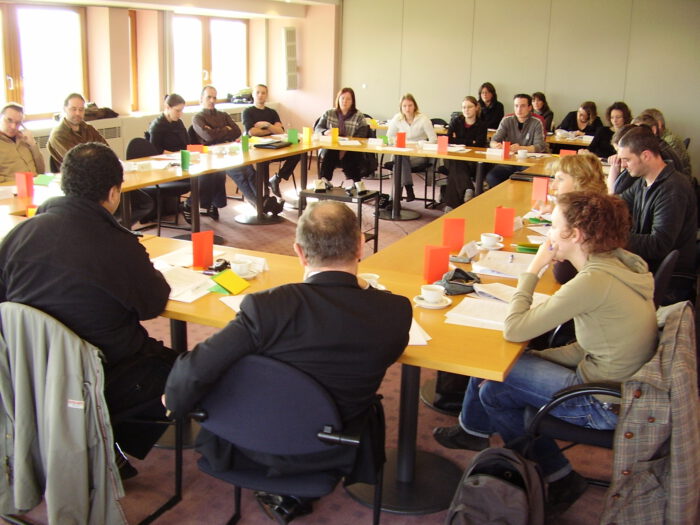Daily management
At the General Assembly of 6 December 2016, Prof. Dr. Dirk Van Daele, Professor at the Catholic University of Leuven (Leuven Institute of Criminology), was appointed chairman of the Centre.
From 2004 to 2015, Prof. Dr. Paul Ponsaers, Professor at the Department of Criminology, Criminal Law and Social Law at Ghent University, was chairman of the Centre. In 2016, Alain Duchatelet assumed the chairmanship ad interim.
Vice-chairman is Mr. Mark Crispel, Chief Superintendent of the Police Zone Zennevallei. Marc Bloeyaert and Fernand Hollevoet are also members of the daily management board.
These board members are supported by the secretary, Nathalie Roegiers.
Together they are responsible for the day-to-day management of the CPS.
Board of Administrators and General Assembly
Board of Administrators
The Centre for Policing & Security has a board of administrators. It meets bimonthly and consists of representatives of the local and federal police and other security and investigation services, emergency services, authorities, private partners and academics. The cooperation between these security services and the academic world is therefore not only evident in the design and content of the organized activities, but is inherent in the structure of the CPS.
It is up to the board of administrators to define the various mandates of the board members.
Since 2015, the board is using a matrix structure according to a number of fields of study. These are areas of work around which the CPS wishes to work. In this way, the CPS does not limit itself to purely police-related problems and issues, but focuses on the broad field of security. The aim is to appeal to a broad public.
It concerns the following areas of work:
- police
- local integrated security policy (LISP)
- special inspection services and anti-fraud
- events and crisis management
- innovation, technology and security (ITS)
- international police and judicial cooperation
- police powers
The board of administators meets 5 to 6 times a year. The day-to-day management board consults with each other in case of urgent matters. All members in the matrix are members of the board of administrators. It is the intention that at least one of the pilots of each field of study is present at the meetings of the board of administrators.
In addition to the chairman, a maximum of two vice-chairmen will be appointed among the administrators. In addition, a consultant function has been added since 2018. The administrators are appointed by the general assembly and the mandates are divided within the board of administrators. The board of administrators may request the presence of external experts to deal with certain matters. The board of administrators coordinates the functioning of the center and relies on the cooperation of members of the general assembly and of the fields of study for its concrete elaboration.
The agenda of this board of administrators goes more in the direction of internal vision formation as a testing framework for the assessment of proposals concerning actions, activities as proposed in the meetings of the general assembly (which meets a maximum of twice a year). The members of the board of administrators are unremunerated.
General Assembly
All members of the general assembly are members of the CPS. Members join voluntarily and contribute to the realization of the mission on a voluntary basis. They are willing to act as working members. They join in their personal name and do not represent institutions, organizations or interest groups.
The CPS adheres to the principle that its members are free to express themselves. This means that they can express or defend opinions in their personal name. All other members must treat this with respect. In other words, the CPS does not take into account any hierarchical relationships that may exist outside it. In short, the CPS encourages all those who wish to subscribe to its mission to be actively involved in the realization of this mission, and this averse to any hierarchical ranks in which one may find oneself outside the context of the CPS.
The role and function of the General Assembly concerns a general “work” meeting at which the proposals for the various initiatives are initially explained, proposed and approved. It is also here that the concrete implementation of these work plans and the input of the members are agreed upon. This general meeting thus fulfils a function that shows the actual commitment and involvement of the members in the operation of the non-profit organization.
In addition, the General Assembly is convened at least once a year to take a number of important decisions that the law expressly reserves to this body, including the approval of the budget and the financial accounts. The General Assembly also includes representatives of the local and federal police, intelligence and security services, public authorities, private partners and academics. The members of the General Assembly are unremunerated.


